Analysis of Ethical Dilemma in Neonatal Nursing: Case Study Solution
VerifiedAdded on 2022/11/29
|5
|1038
|142
Case Study
AI Summary
This case study examines an ethical dilemma faced by a neonatal nurse, Mr. Simmons, concerning the treatment of a premature infant. The analysis focuses on the violation of ethical principles, including beneficence, nonmaleficence, autonomy, and justice, by the obstetrician and pediatric associate. The obstetrician provides unnecessary and potentially harmful information to the mother, while the pediatric associate attempts to discontinue life support. Mr. Simmons is placed in a difficult position as he witnesses the physicians' actions, which violate patient rights. The analysis highlights the importance of informed consent, patient advocacy, and the nurse's role in upholding ethical standards. The conclusion emphasizes the necessity for nurses to be assertive and report unethical behavior, ensuring patient well-being and upholding professional integrity, with proper APA citations and references.
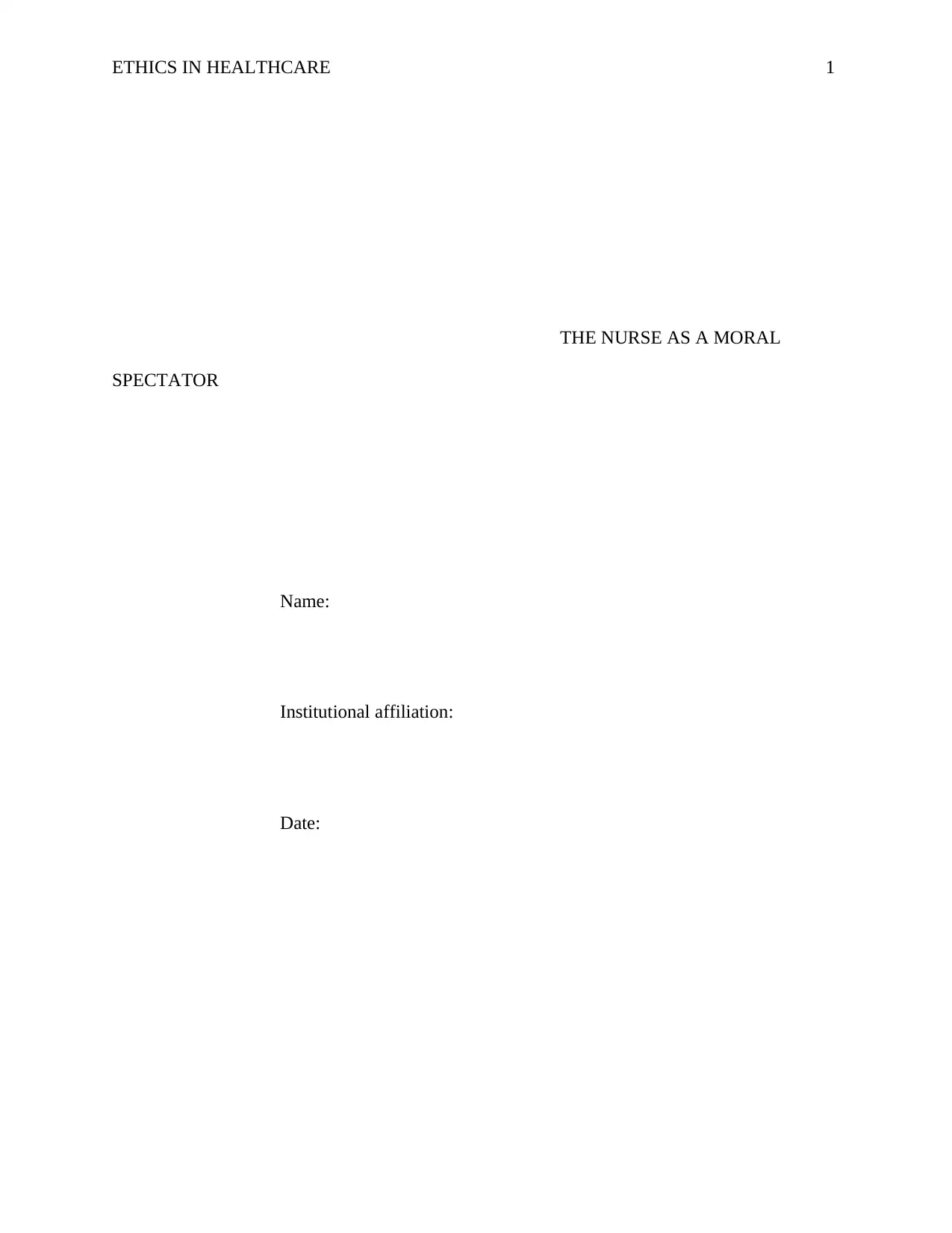
ETHICS IN HEALTHCARE 1
THE NURSE AS A MORAL
SPECTATOR
Name:
Institutional affiliation:
Date:
THE NURSE AS A MORAL
SPECTATOR
Name:
Institutional affiliation:
Date:
Paraphrase This Document
Need a fresh take? Get an instant paraphrase of this document with our AI Paraphraser
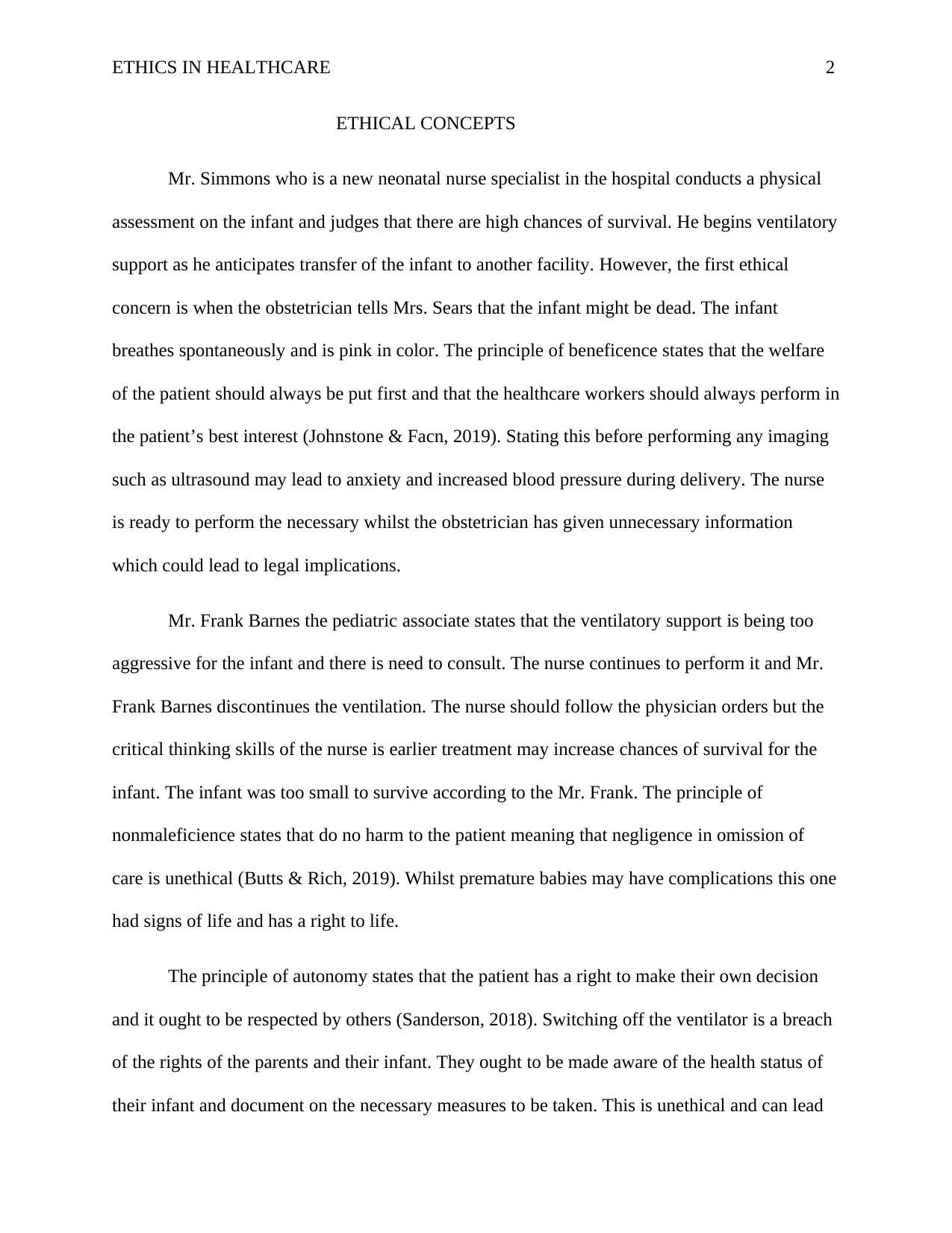
ETHICS IN HEALTHCARE 2
ETHICAL CONCEPTS
Mr. Simmons who is a new neonatal nurse specialist in the hospital conducts a physical
assessment on the infant and judges that there are high chances of survival. He begins ventilatory
support as he anticipates transfer of the infant to another facility. However, the first ethical
concern is when the obstetrician tells Mrs. Sears that the infant might be dead. The infant
breathes spontaneously and is pink in color. The principle of beneficence states that the welfare
of the patient should always be put first and that the healthcare workers should always perform in
the patient’s best interest (Johnstone & Facn, 2019). Stating this before performing any imaging
such as ultrasound may lead to anxiety and increased blood pressure during delivery. The nurse
is ready to perform the necessary whilst the obstetrician has given unnecessary information
which could lead to legal implications.
Mr. Frank Barnes the pediatric associate states that the ventilatory support is being too
aggressive for the infant and there is need to consult. The nurse continues to perform it and Mr.
Frank Barnes discontinues the ventilation. The nurse should follow the physician orders but the
critical thinking skills of the nurse is earlier treatment may increase chances of survival for the
infant. The infant was too small to survive according to the Mr. Frank. The principle of
nonmaleficience states that do no harm to the patient meaning that negligence in omission of
care is unethical (Butts & Rich, 2019). Whilst premature babies may have complications this one
had signs of life and has a right to life.
The principle of autonomy states that the patient has a right to make their own decision
and it ought to be respected by others (Sanderson, 2018). Switching off the ventilator is a breach
of the rights of the parents and their infant. They ought to be made aware of the health status of
their infant and document on the necessary measures to be taken. This is unethical and can lead
ETHICAL CONCEPTS
Mr. Simmons who is a new neonatal nurse specialist in the hospital conducts a physical
assessment on the infant and judges that there are high chances of survival. He begins ventilatory
support as he anticipates transfer of the infant to another facility. However, the first ethical
concern is when the obstetrician tells Mrs. Sears that the infant might be dead. The infant
breathes spontaneously and is pink in color. The principle of beneficence states that the welfare
of the patient should always be put first and that the healthcare workers should always perform in
the patient’s best interest (Johnstone & Facn, 2019). Stating this before performing any imaging
such as ultrasound may lead to anxiety and increased blood pressure during delivery. The nurse
is ready to perform the necessary whilst the obstetrician has given unnecessary information
which could lead to legal implications.
Mr. Frank Barnes the pediatric associate states that the ventilatory support is being too
aggressive for the infant and there is need to consult. The nurse continues to perform it and Mr.
Frank Barnes discontinues the ventilation. The nurse should follow the physician orders but the
critical thinking skills of the nurse is earlier treatment may increase chances of survival for the
infant. The infant was too small to survive according to the Mr. Frank. The principle of
nonmaleficience states that do no harm to the patient meaning that negligence in omission of
care is unethical (Butts & Rich, 2019). Whilst premature babies may have complications this one
had signs of life and has a right to life.
The principle of autonomy states that the patient has a right to make their own decision
and it ought to be respected by others (Sanderson, 2018). Switching off the ventilator is a breach
of the rights of the parents and their infant. They ought to be made aware of the health status of
their infant and document on the necessary measures to be taken. This is unethical and can lead
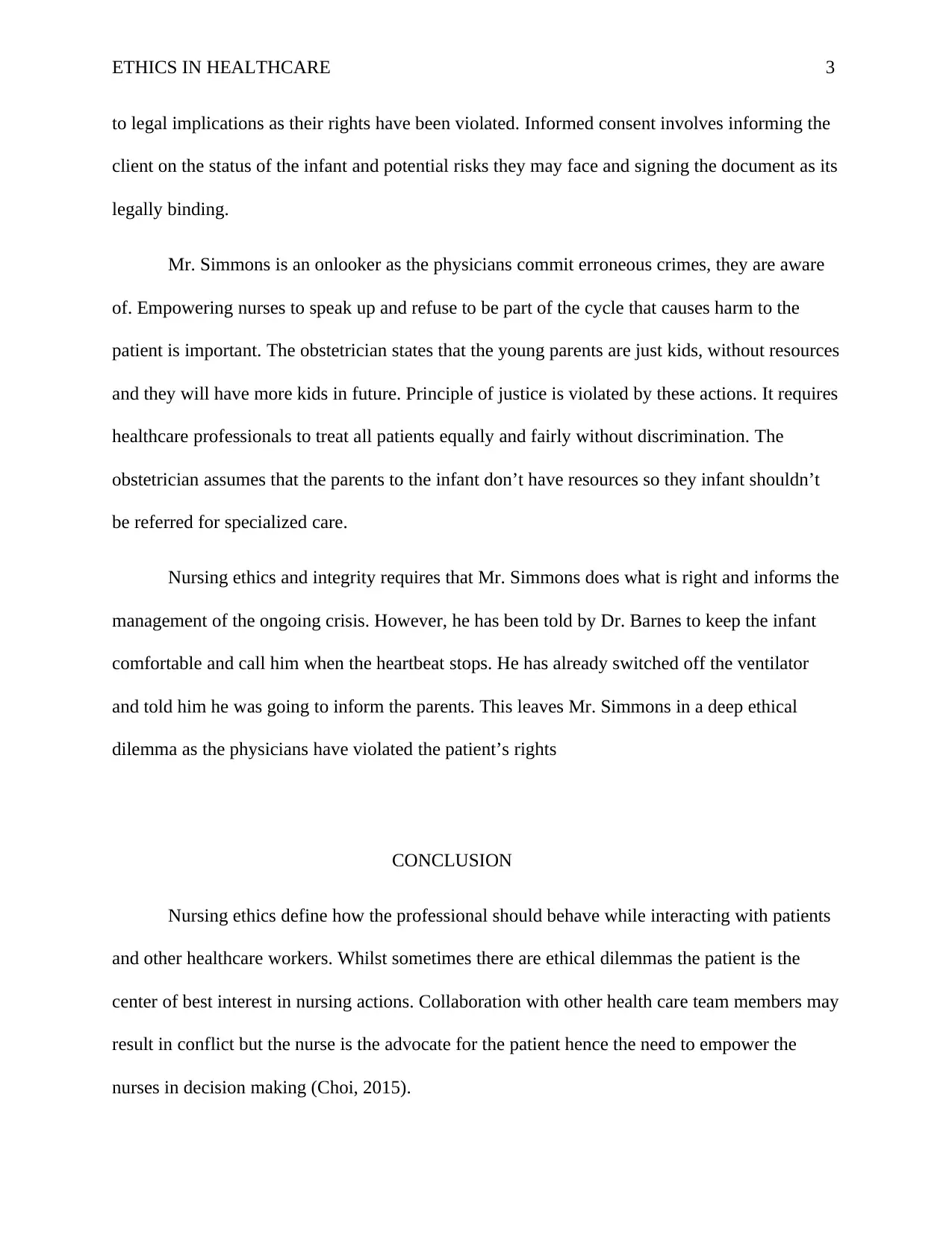
ETHICS IN HEALTHCARE 3
to legal implications as their rights have been violated. Informed consent involves informing the
client on the status of the infant and potential risks they may face and signing the document as its
legally binding.
Mr. Simmons is an onlooker as the physicians commit erroneous crimes, they are aware
of. Empowering nurses to speak up and refuse to be part of the cycle that causes harm to the
patient is important. The obstetrician states that the young parents are just kids, without resources
and they will have more kids in future. Principle of justice is violated by these actions. It requires
healthcare professionals to treat all patients equally and fairly without discrimination. The
obstetrician assumes that the parents to the infant don’t have resources so they infant shouldn’t
be referred for specialized care.
Nursing ethics and integrity requires that Mr. Simmons does what is right and informs the
management of the ongoing crisis. However, he has been told by Dr. Barnes to keep the infant
comfortable and call him when the heartbeat stops. He has already switched off the ventilator
and told him he was going to inform the parents. This leaves Mr. Simmons in a deep ethical
dilemma as the physicians have violated the patient’s rights
CONCLUSION
Nursing ethics define how the professional should behave while interacting with patients
and other healthcare workers. Whilst sometimes there are ethical dilemmas the patient is the
center of best interest in nursing actions. Collaboration with other health care team members may
result in conflict but the nurse is the advocate for the patient hence the need to empower the
nurses in decision making (Choi, 2015).
to legal implications as their rights have been violated. Informed consent involves informing the
client on the status of the infant and potential risks they may face and signing the document as its
legally binding.
Mr. Simmons is an onlooker as the physicians commit erroneous crimes, they are aware
of. Empowering nurses to speak up and refuse to be part of the cycle that causes harm to the
patient is important. The obstetrician states that the young parents are just kids, without resources
and they will have more kids in future. Principle of justice is violated by these actions. It requires
healthcare professionals to treat all patients equally and fairly without discrimination. The
obstetrician assumes that the parents to the infant don’t have resources so they infant shouldn’t
be referred for specialized care.
Nursing ethics and integrity requires that Mr. Simmons does what is right and informs the
management of the ongoing crisis. However, he has been told by Dr. Barnes to keep the infant
comfortable and call him when the heartbeat stops. He has already switched off the ventilator
and told him he was going to inform the parents. This leaves Mr. Simmons in a deep ethical
dilemma as the physicians have violated the patient’s rights
CONCLUSION
Nursing ethics define how the professional should behave while interacting with patients
and other healthcare workers. Whilst sometimes there are ethical dilemmas the patient is the
center of best interest in nursing actions. Collaboration with other health care team members may
result in conflict but the nurse is the advocate for the patient hence the need to empower the
nurses in decision making (Choi, 2015).
⊘ This is a preview!⊘
Do you want full access?
Subscribe today to unlock all pages.

Trusted by 1+ million students worldwide
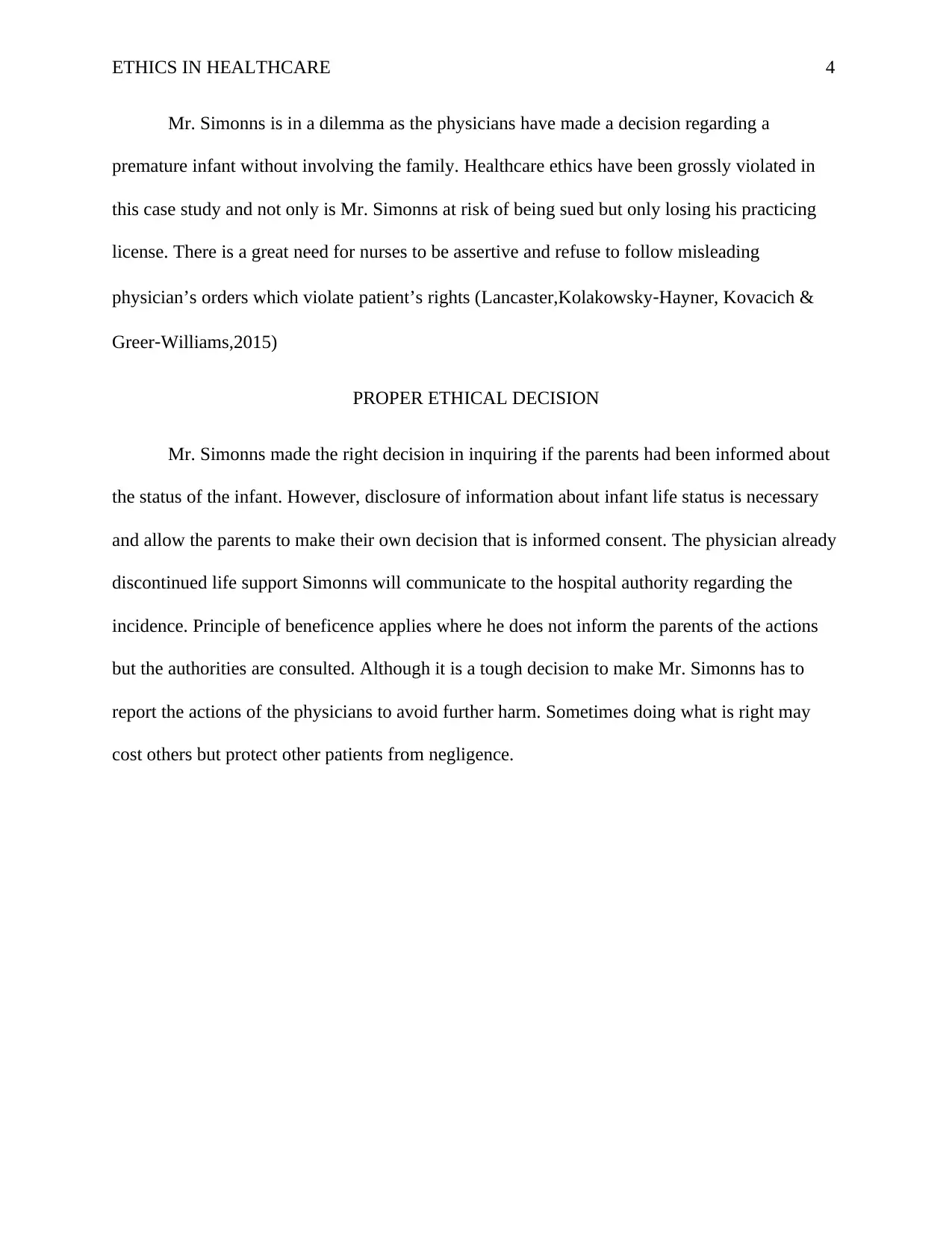
ETHICS IN HEALTHCARE 4
Mr. Simonns is in a dilemma as the physicians have made a decision regarding a
premature infant without involving the family. Healthcare ethics have been grossly violated in
this case study and not only is Mr. Simonns at risk of being sued but only losing his practicing
license. There is a great need for nurses to be assertive and refuse to follow misleading
physician’s orders which violate patient’s rights (Lancaster,Kolakowsky‐Hayner, Kovacich &
Greer‐Williams,2015)
PROPER ETHICAL DECISION
Mr. Simonns made the right decision in inquiring if the parents had been informed about
the status of the infant. However, disclosure of information about infant life status is necessary
and allow the parents to make their own decision that is informed consent. The physician already
discontinued life support Simonns will communicate to the hospital authority regarding the
incidence. Principle of beneficence applies where he does not inform the parents of the actions
but the authorities are consulted. Although it is a tough decision to make Mr. Simonns has to
report the actions of the physicians to avoid further harm. Sometimes doing what is right may
cost others but protect other patients from negligence.
Mr. Simonns is in a dilemma as the physicians have made a decision regarding a
premature infant without involving the family. Healthcare ethics have been grossly violated in
this case study and not only is Mr. Simonns at risk of being sued but only losing his practicing
license. There is a great need for nurses to be assertive and refuse to follow misleading
physician’s orders which violate patient’s rights (Lancaster,Kolakowsky‐Hayner, Kovacich &
Greer‐Williams,2015)
PROPER ETHICAL DECISION
Mr. Simonns made the right decision in inquiring if the parents had been informed about
the status of the infant. However, disclosure of information about infant life status is necessary
and allow the parents to make their own decision that is informed consent. The physician already
discontinued life support Simonns will communicate to the hospital authority regarding the
incidence. Principle of beneficence applies where he does not inform the parents of the actions
but the authorities are consulted. Although it is a tough decision to make Mr. Simonns has to
report the actions of the physicians to avoid further harm. Sometimes doing what is right may
cost others but protect other patients from negligence.
Paraphrase This Document
Need a fresh take? Get an instant paraphrase of this document with our AI Paraphraser
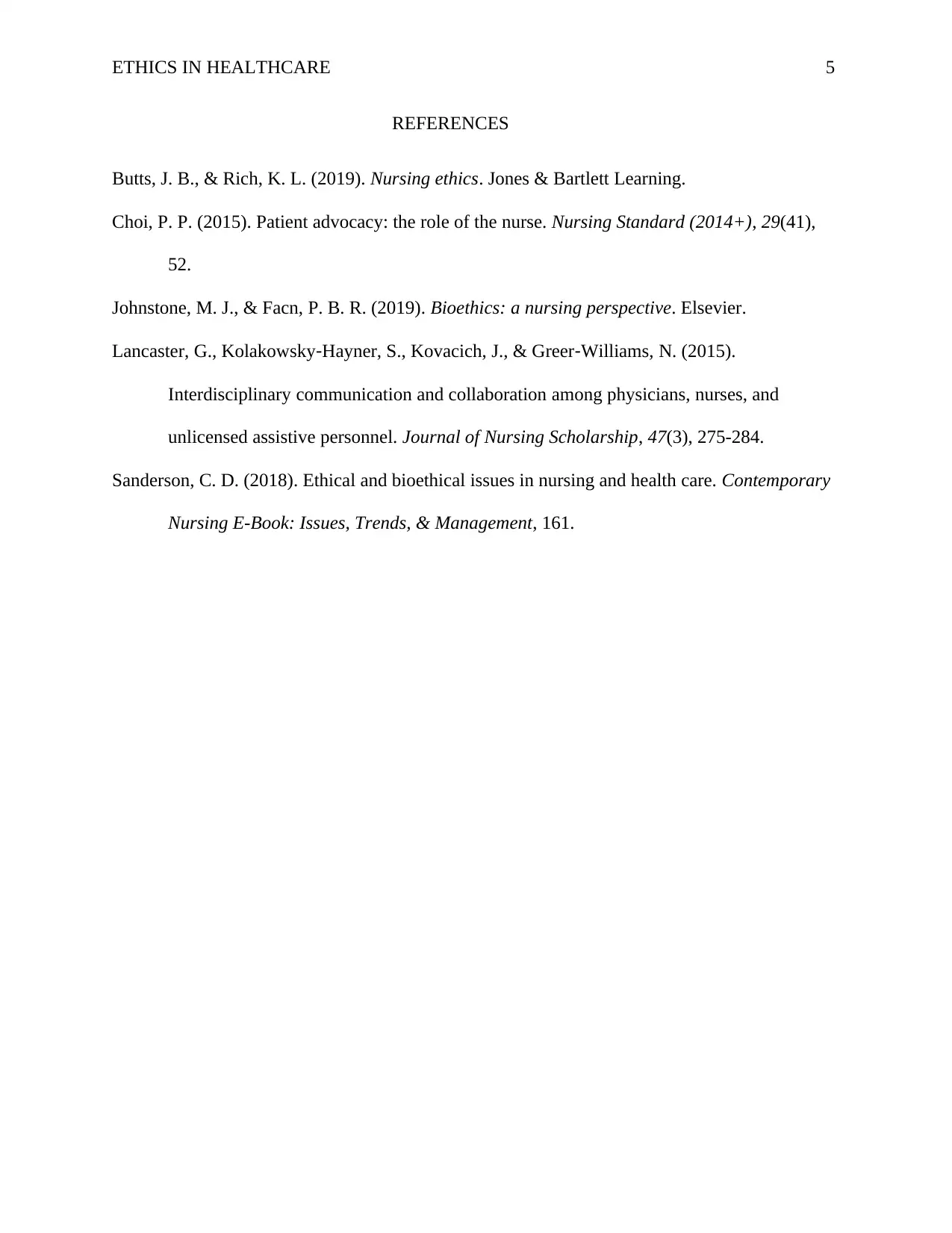
ETHICS IN HEALTHCARE 5
REFERENCES
Butts, J. B., & Rich, K. L. (2019). Nursing ethics. Jones & Bartlett Learning.
Choi, P. P. (2015). Patient advocacy: the role of the nurse. Nursing Standard (2014+), 29(41),
52.
Johnstone, M. J., & Facn, P. B. R. (2019). Bioethics: a nursing perspective. Elsevier.
Lancaster, G., Kolakowsky‐Hayner, S., Kovacich, J., & Greer‐Williams, N. (2015).
Interdisciplinary communication and collaboration among physicians, nurses, and
unlicensed assistive personnel. Journal of Nursing Scholarship, 47(3), 275-284.
Sanderson, C. D. (2018). Ethical and bioethical issues in nursing and health care. Contemporary
Nursing E-Book: Issues, Trends, & Management, 161.
REFERENCES
Butts, J. B., & Rich, K. L. (2019). Nursing ethics. Jones & Bartlett Learning.
Choi, P. P. (2015). Patient advocacy: the role of the nurse. Nursing Standard (2014+), 29(41),
52.
Johnstone, M. J., & Facn, P. B. R. (2019). Bioethics: a nursing perspective. Elsevier.
Lancaster, G., Kolakowsky‐Hayner, S., Kovacich, J., & Greer‐Williams, N. (2015).
Interdisciplinary communication and collaboration among physicians, nurses, and
unlicensed assistive personnel. Journal of Nursing Scholarship, 47(3), 275-284.
Sanderson, C. D. (2018). Ethical and bioethical issues in nursing and health care. Contemporary
Nursing E-Book: Issues, Trends, & Management, 161.
1 out of 5
Your All-in-One AI-Powered Toolkit for Academic Success.
+13062052269
info@desklib.com
Available 24*7 on WhatsApp / Email
![[object Object]](/_next/static/media/star-bottom.7253800d.svg)
Unlock your academic potential
Copyright © 2020–2025 A2Z Services. All Rights Reserved. Developed and managed by ZUCOL.
